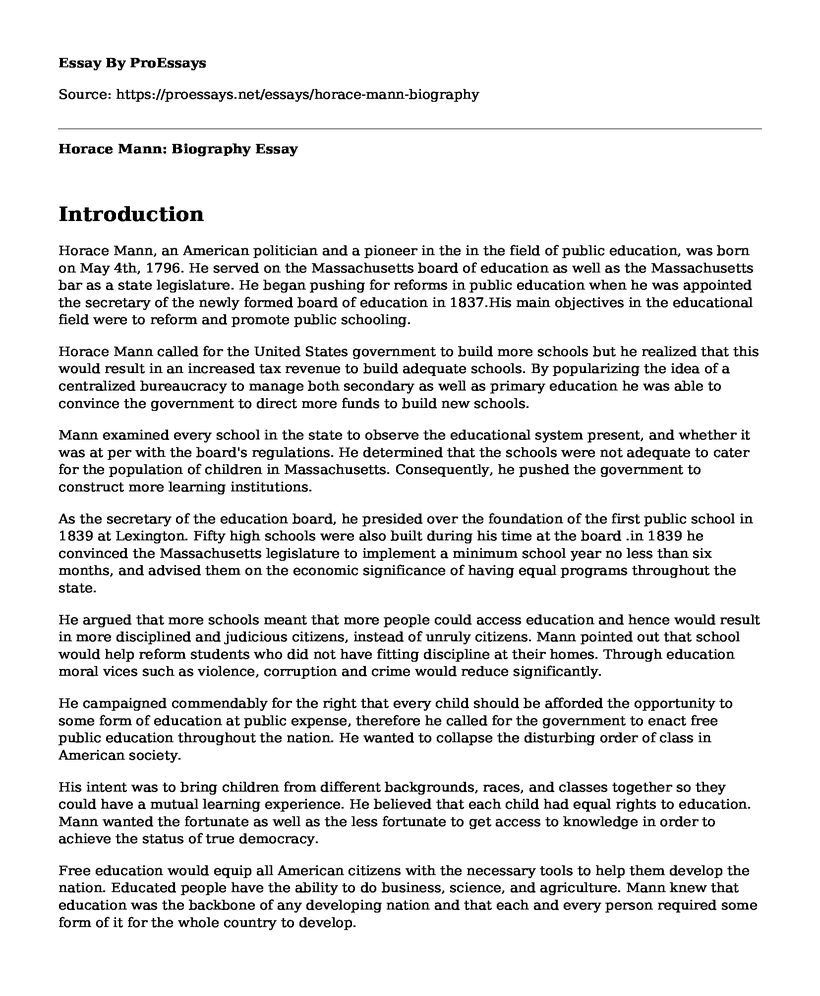Introduction
Horace Mann, an American politician and a pioneer in the in the field of public education, was born on May 4th, 1796. He served on the Massachusetts board of education as well as the Massachusetts bar as a state legislature. He began pushing for reforms in public education when he was appointed the secretary of the newly formed board of education in 1837.His main objectives in the educational field were to reform and promote public schooling.Horace Mann called for the United States government to build more schools but he realized that this would result in an increased tax revenue to build adequate schools. By popularizing the idea of a centralized bureaucracy to manage both secondary as well as primary education he was able to convince the government to direct more funds to build new schools.
Mann examined every school in the state to observe the educational system present, and whether it was at per with the board's regulations. He determined that the schools were not adequate to cater for the population of children in Massachusetts. Consequently, he pushed the government to construct more learning institutions.
As the secretary of the education board, he presided over the foundation of the first public school in 1839 at Lexington. Fifty high schools were also built during his time at the board .in 1839 he convinced the Massachusetts legislature to implement a minimum school year no less than six months, and advised them on the economic significance of having equal programs throughout the state.
He argued that more schools meant that more people could access education and hence would result in more disciplined and judicious citizens, instead of unruly citizens. Mann pointed out that school would help reform students who did not have fitting discipline at their homes. Through education moral vices such as violence, corruption and crime would reduce significantly.
He campaigned commendably for the right that every child should be afforded the opportunity to some form of education at public expense, therefore he called for the government to enact free public education throughout the nation. He wanted to collapse the disturbing order of class in American society.
His intent was to bring children from different backgrounds, races, and classes together so they could have a mutual learning experience. He believed that each child had equal rights to education. Mann wanted the fortunate as well as the less fortunate to get access to knowledge in order to achieve the status of true democracy.
Free education would equip all American citizens with the necessary tools to help them develop the nation. Educated people have the ability to do business, science, and agriculture. Mann knew that education was the backbone of any developing nation and that each and every person required some form of it for the whole country to develop.
A free education to all citizens was the best way according to him to achieve a socioeconomic and moral uplift of all citizens. Poverty could be eradicated if every citizen had some form of knowledge learned in school that could be used in affording them a livelihood. Education would also directly lead to better opportunities and better-paying jobs.
Horace Mann advocated that every public educational body should have the highest standard of quality and professional teachers. He believed that for children to gain a proper education and to have high moral standards they had to have quality educators who were morally upright. He also pushed for the introduction of religious studies in the education system to ensure the students learned the values of having proper morals.
He was responsible for leading the movement that resulted in the setting up teacher's institutions throughout Massachusetts also known as the 'normal schools'.Mann opened up the training facilities for teachers, to ensure that they maintained the highest level of professionalism as well as educate them so they would, in turn, be able to educate the children. To this day for one to become a school teacher in a public institute, they must have a college degree.
He engaged in the reforms of teachers and their methods of teaching. Some of this reforms were to cater for the insane physically and mentally handicapped students who had a difficult time learning with the rest of the students. Under The normal schools initiative, some teachers were specifically equipped with the know-how of catering for the handicapped students and special schools with special teachers were developed to that effect.
Mann authored many education books and developed a communal school journal that was employed by all teaching staff the state before this teachers did not follow a specified curriculum or set of school standards and consequently taught differently. Mann also emphasized the importance of holding regular teachers conventions, to discuss important matters such as updating and revising the curricula. Through these conventions, educators were able to exchange ideas and information relevant to teaching.
Conclusion
Horace Mann's influence on America's education reforms cannot be overstated, without his contributions the public education systems would be poor and ineffective. Mann did many great things to alter the state conditions of schools and teachers, and his ideas are still in effect today. A great number of the less fortunate have acquired education thanks to this ideas as well.
Cite this page
Horace Mann: Biography. (2022, Apr 07). Retrieved from https://proessays.net/essays/horace-mann-biography
If you are the original author of this essay and no longer wish to have it published on the ProEssays website, please click below to request its removal:
- Whether or Not to Build The Border Wall - Essay Sample
- Sources for Accreditation in Primary Care - Paper Example
- A Mock Constitutional Convention Essay Example
- Separation of Illegal Families Annotated Bibliography
- Essay on Barack Obama: Gratitude Speech After Nomination as Flag Bearer for Democratic Party
- U.S. Immigration Policy: 44.7 Million and Counting - Essay Sample
- Essay Example on Unlock Collective Power: Civil Engagement and Interests Groups







